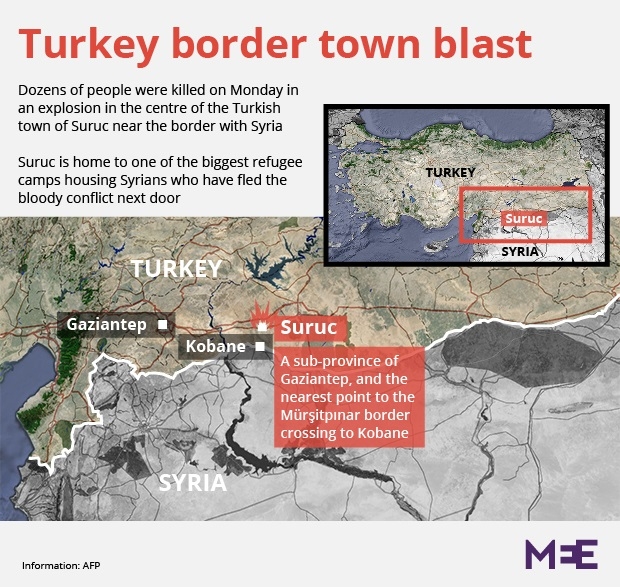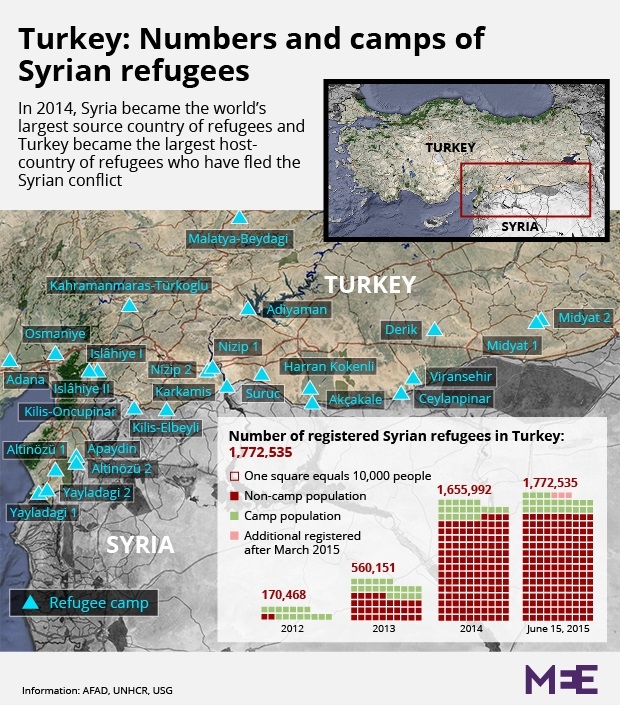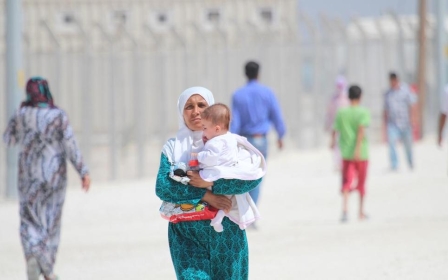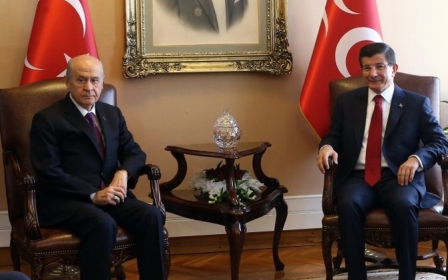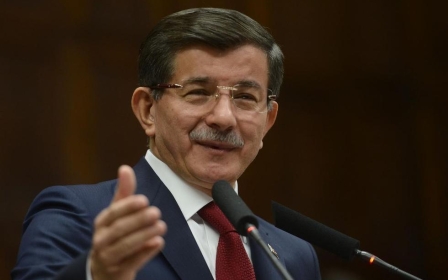At least 31 dead in Turkey border town blast
At least 31 people were killed and nearly 100 injured on Monday in a suicide attack in the Turkish town of Suruc near the border with Syria, officials said.
The explosion appears to have been aimed at a press conference held for a group of 300 members of the Federation of Socialist Youth Organisation (SGDF) who were planning to visit the Syrian border town of Kobane to do volunteer work over the summer.
Turkish politicians called for unity in the wake of the blast, the cause of which was not immediately clear.
Prime Minister Ahmet Davutoglu said investigations were taking place into the blast, which hit a town opposite the flashpoint Syrian town of Kobane.
Speaking to the press on Monday afternoon, Davutoglu said initial findings pointed to the involvement of Islamic State in the attack, which also left 104 people injured.
"This is a moment that requires us all to stand together in the face of this a terrorist attack," the premier said.
Several protests were held in Diyarbakir, Ankara and Istanbul in which demonstrators expressed frustration with the government's inaction against IS.
MEE's Alex MacDonald was at a protest on Istiklal Avenue in Istanbul on Monday evening. Political activists were giving speeches at the demonstration when police started to fire on the crowd with tear gas seemingly without provocation, he reported. [Photos of the protest at end of story]
Monday's blast came shortly before three explosions also hit the Kurdish-majority town of Kobane. The Turkish government official, speaking on condition of anonymity, said a near simultaneous timing of the attacks "strengthen[ed] our suspicions" about IS involvement. IS have yet to claim responsability but if they do, this would mark the group's first strike of this magnitude on Turkish soil.
However, while some initial reports suggested that the Kobane blasts could have been carried out by IS, Kurdish sources have since confirmed to MEE that the explosions appear to have been a "coincidence" despite their earlier suspicions.
Alan Semo, the UK-based representative of the the Democratic Union Party, the main Kurdish political force in Syria, said that after an investigation, reports of simultaneous suicide blasts have been ruled out. Instead, it is believed that three mines exploded, killing five Kurdish security personnel but no civilians.
Local journalist Barzan Iso told Middle East Eye that the explosions could be due to the extremely hot weather which reached highs of 40 degrees Celsius today and could have made the explosives "more unstable" than usual.
Reactions to blasts
A senior Turkish government official, speaking from the prime minister’s headquarters in Ankara, told MEE:
“Our understanding [is that] this [Suruc incident] is an act of retaliation against the Turkish government’s continued efforts to fight terrorism.
“There were a series of arrests and new restrictions placed on pro-IS websites. We understand that the incidents followed last week’s developments.”
“We want to take this opportunity to call upon the international coalition to more actively pursue a solution to the political crisis in Syria.”
Turkish President Recep Tayyip Erdogan also condemned the Suruc blast as "act of terror".
"We are drowning in grief that 28 citizens died and a large number of people were injured as a result of an act of terror," Erdogan said during a visit to the Turkish breakaway state in northern Cyprus.
"On behalf of my people, I curse and condemn the perpetrators of this brutality."
Turkish Prime Minister Ahmet Davutoglu will now send three ministers - Deputy Prime Minister Numan Kurtulmus, Interior Minister Sebahattin Ozturk and Labour Minister Faruk Celik - to the region, his office announced.
But Kurdish officials have been quick to lash out at Turkey, saying that more should have been done to prevent the atrocity and accusing some elements within the Turkish security services of possibly even helping to orchestrate the attack.
"This attack has unfortunately been facilitated by Turkey," said Semo. "They want to destabilise the region and have serious issues with [parts of northern Syria] being under Kurdish control. There is a brutal war in Syria but to see this happen in Turkey is very serious indeed. Turkey has long had a strategy to invade north Syria to free it of [the] Kurdish presence. They have been pushing for a no-fly zone etc but NATO and the US have not agreed to this."
"The international community has to act now and investigate how this happened," he added.
Meanwhile, the White House said it "strongly condemns the heinous terrorist attack that occurred in southern Turkey."
"We have started to see some extremist activity in other countries that does seem to be related to ISIL," White House spokesman Josh Earnest said, using an acronym for IS.
Horror unfolds
Witnesses in Suruc said fire broke out after the explosion and television footage showed ambulances rushing to the scene.
A Turkish government official confirmed to AFP that the explosion occurred in the garden of a culture centre in Suruc.
According to Kurdish journalist Jack Shahine, the cultural centre was a hub for the meeting of foreign journalists and activists.
“Most of the students at the centre who’d come from Istanbul were friends of a college girl called Kadar Ortakya who was killed by the Turkish military while she attempted to cross the border into Kobane last year,” Shahine told Middle East Eye.
Suruc is home to one of the biggest refugee camps housing Syrians who have fled the bloody conflict next door.
The camp, which opened in January, shelters about 35,000 refugees who crossed the border after IS militants seized Kobane last year.
After months of fighting, Kurdish forces - backed by Syrian rebel groups and US-led air strikes against IS – finally managed to push the militants out of Kobane in January in what proved to be hugely symbolic defeat for IS.
But IS launched a surprise attack on the Syrian town last month, staging three suicide bombings and re-entering the town before eventually being beaten back.
More than 120 civilians were killed in the attack and many of the injured were taken to hospitals in Suruc after the raid.
Several hundred thousand Syrians have taken refuge in Turkish camps along the border but the vast majority of them are scattered in major cities, where their presence has stoked tensions with locals.
New MEE newsletter: Jerusalem Dispatch
Sign up to get the latest insights and analysis on Israel-Palestine, alongside Turkey Unpacked and other MEE newsletters
Middle East Eye delivers independent and unrivalled coverage and analysis of the Middle East, North Africa and beyond. To learn more about republishing this content and the associated fees, please fill out this form. More about MEE can be found here.


